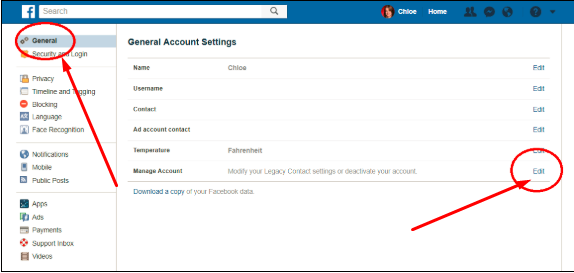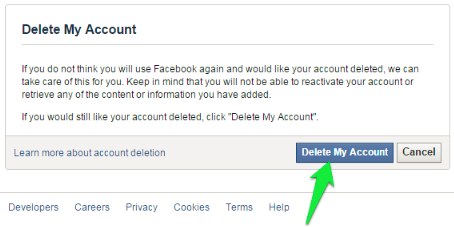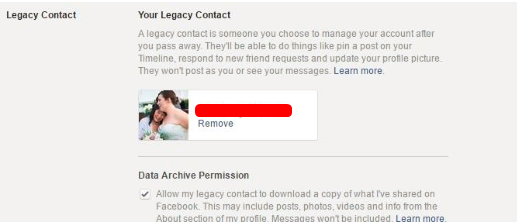How to Delete Facebook Account Steps
By
Anjih Najxu
—
Jan 7, 2019
—
Deleting Facebook Account
Current events could have you pondering a break from Facebook. That's not an option for every person; in that instance, just tighten up your account settings. How To Delete Facebook Account Steps: Yet if having your information mined for political functions without your authorization illustrations you out, there are means to liberate yourself from the substantial social media.

If you're ready for a social media sites break, right here's how to delete Facebook.
Deactivating
Facebook provides you two choices: 2 choices: deactivate or erase
The first couldn't be simpler. On the desktop computer, click the drop-down menu at the top-right of your screen and also select settings. Click General on the top left, Edit next to "Manage Account" Scroll down and you'll see a "Deactivate My Account" link near the bottom. (Here's the direct link to make use of while visited.).
If you get on your mobile phone, such as making use of Facebook for iphone, in a similar way most likely to settings > Account settings > General > Manage Account > Deactivate.

Facebook does not take this gently - it'll do whatever it can to maintain you about, including psychological blackmail about how much your friends will certainly miss you.
Thus, "Deactivation" is not the like leaving Facebook. Yes, your timeline will vanish, you will not have accessibility to the website or your account via mobile applications, friends can't upload or contact you, and also you'll shed access to all those third-party services that make use of (or need) Facebook for login. But Facebook does not remove the account. Why? So you can reactivate it later.
Simply if expected re-activation isn't in your future, you must download a copy of all your data on Facebook - posts, pictures, videos, talks, etc.-- from the settings menu (under "General"). What you locate could surprise you, as our Neil Rubenking learnt.
Account Deletion

To fully erase your Facebook account forever and ever, most likely to the Erase My Account page at https://www.facebook.com/help/delete_account. Just realize that, per the Facebook data use policy "after you eliminate details from your profile or erase your account, copies of that details could continue to be viewable somewhere else to the degree it has actually been shown to others, it was otherwise dispersed pursuant to your personal privacy settings, or it was replicated or saved by various other individuals.".
Translation: if you composed a talk about a buddy's condition upgrade or picture, it will continue to be after you remove your personal account. A few of your posts and photos might spend time for as long as 90 days after deletion, too, however just on Facebook servers, not live on the site.
Removal on Behalf of Others
If you want to notify Facebook about an individual you know is under 13, you could report the account, you narc. If Facebook could "reasonably confirm" the account is used by somebody underage-- Facebook bans kids under 13 to abide by federal legislation-- it will delete the account instantaneously, without informing anybody.
There's a different kind to request removal of accounts for individuals that are clinically incapacitated and therefore incapable to utilize Facebook. For this to function, the requester should prove they are the guardian of the person concerned (such as by power of attorney) in addition to deal an official note from a doctor or clinical facility that define the incapacitation. Edit any kind of information needed to maintain some privacy, such as medical account numbers, addresses, etc.
If a user has passed away, a heritage get in touch with-- a Facebook pal or loved one who was designated by the account owner before they passed away-- can get accessibility to that person's timeline, once accepted by Facebook. The legacy get in touch with might need to give a link to an obituary or other paperwork such as a fatality certificate. Facebook will "hallow" the web page so the deceased timeline lives on (under control of the legacy contact, who can not post as you), or if liked, remove it.

Mark a certain tradition call individual to manage your account after your passing away. You could discover that under settings > General > Manage Account > Your Legacy Contact. When you established one up, you'll get an alert yearly from Facebook to check that the call should stay the exact same, unless you opt out of that. You could also take the added step of seeing to it that after you die, if the legacy get in touch with does report you to Facebook as deceased, your account gets deleted (even if the tradition get in touch with desires the timeline to be memorialized).

If you're ready for a social media sites break, right here's how to delete Facebook.
How To Delete Facebook Account Steps
Deactivating
Facebook provides you two choices: 2 choices: deactivate or erase
The first couldn't be simpler. On the desktop computer, click the drop-down menu at the top-right of your screen and also select settings. Click General on the top left, Edit next to "Manage Account" Scroll down and you'll see a "Deactivate My Account" link near the bottom. (Here's the direct link to make use of while visited.).
If you get on your mobile phone, such as making use of Facebook for iphone, in a similar way most likely to settings > Account settings > General > Manage Account > Deactivate.

Facebook does not take this gently - it'll do whatever it can to maintain you about, including psychological blackmail about how much your friends will certainly miss you.
Thus, "Deactivation" is not the like leaving Facebook. Yes, your timeline will vanish, you will not have accessibility to the website or your account via mobile applications, friends can't upload or contact you, and also you'll shed access to all those third-party services that make use of (or need) Facebook for login. But Facebook does not remove the account. Why? So you can reactivate it later.
Simply if expected re-activation isn't in your future, you must download a copy of all your data on Facebook - posts, pictures, videos, talks, etc.-- from the settings menu (under "General"). What you locate could surprise you, as our Neil Rubenking learnt.
Account Deletion

To fully erase your Facebook account forever and ever, most likely to the Erase My Account page at https://www.facebook.com/help/delete_account. Just realize that, per the Facebook data use policy "after you eliminate details from your profile or erase your account, copies of that details could continue to be viewable somewhere else to the degree it has actually been shown to others, it was otherwise dispersed pursuant to your personal privacy settings, or it was replicated or saved by various other individuals.".
Translation: if you composed a talk about a buddy's condition upgrade or picture, it will continue to be after you remove your personal account. A few of your posts and photos might spend time for as long as 90 days after deletion, too, however just on Facebook servers, not live on the site.
Removal on Behalf of Others
If you want to notify Facebook about an individual you know is under 13, you could report the account, you narc. If Facebook could "reasonably confirm" the account is used by somebody underage-- Facebook bans kids under 13 to abide by federal legislation-- it will delete the account instantaneously, without informing anybody.
There's a different kind to request removal of accounts for individuals that are clinically incapacitated and therefore incapable to utilize Facebook. For this to function, the requester should prove they are the guardian of the person concerned (such as by power of attorney) in addition to deal an official note from a doctor or clinical facility that define the incapacitation. Edit any kind of information needed to maintain some privacy, such as medical account numbers, addresses, etc.
If a user has passed away, a heritage get in touch with-- a Facebook pal or loved one who was designated by the account owner before they passed away-- can get accessibility to that person's timeline, once accepted by Facebook. The legacy get in touch with might need to give a link to an obituary or other paperwork such as a fatality certificate. Facebook will "hallow" the web page so the deceased timeline lives on (under control of the legacy contact, who can not post as you), or if liked, remove it.

Mark a certain tradition call individual to manage your account after your passing away. You could discover that under settings > General > Manage Account > Your Legacy Contact. When you established one up, you'll get an alert yearly from Facebook to check that the call should stay the exact same, unless you opt out of that. You could also take the added step of seeing to it that after you die, if the legacy get in touch with does report you to Facebook as deceased, your account gets deleted (even if the tradition get in touch with desires the timeline to be memorialized).





